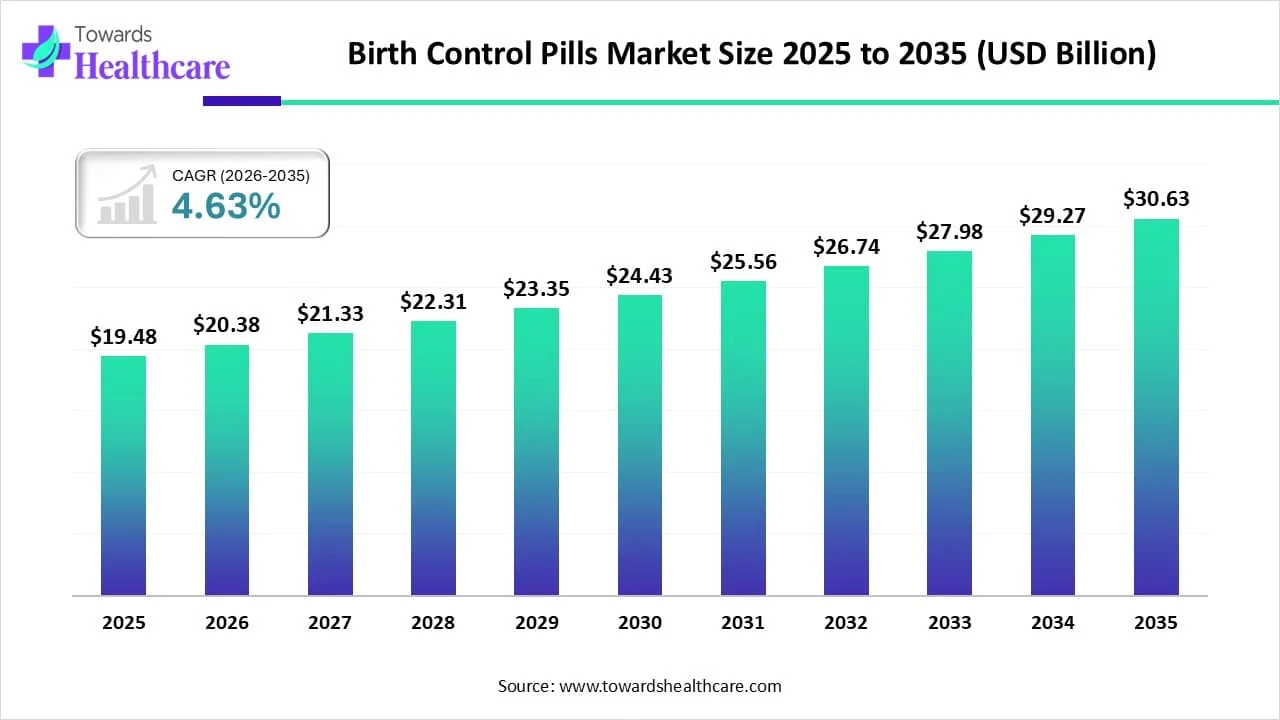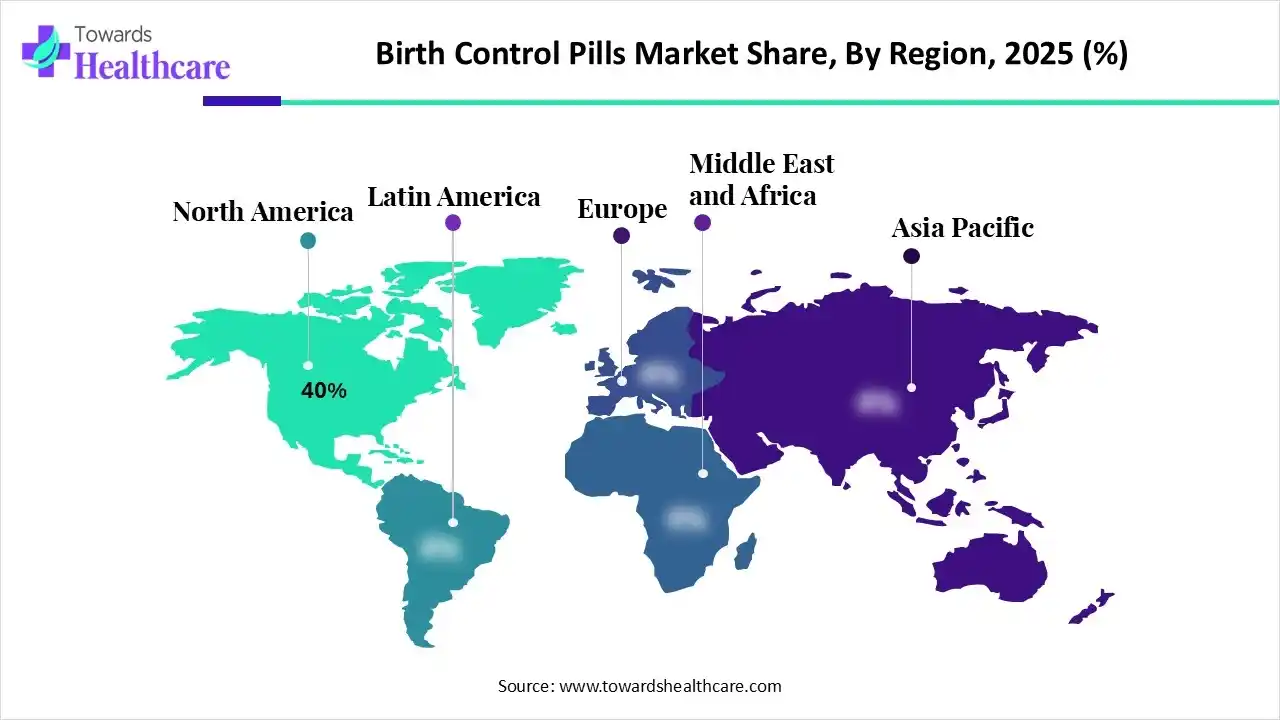October 2025

The birth control pills market size was reported at US$ 19.48 billion in 2025 and is expected to rise to US$ 20.38 billion in 2026. According to forecasts, it will grow at a CAGR of 4.63% to reach US$ 30.63 billion by 2035.

The use of birth control pills is increasing to avoid pregnancy and other menstrual disorders such as irregular menstrual cycle, PCOS, or endometriosis. At the same time, AI is also being used to enhance its accuracy and minimize its side effects, as well as for providing personalized treatments. Moreover, the growing awareness and government support are increasing their use across various regions. Additionally, the companies are also launching and developing new such pills, which in turn is promoting the market growth.
| Key Elements | Scope |
| Market Size in 2026 | USD 20.38 Billion |
| Projected Market Size in 2035 | USD 30.63 Billion |
| CAGR (2026 - 2035) | 4.63% |
| Leading Region | North America by 40% |
| Market Segmentation | By Type, By Hormone Composition, By Application, By Distribution Channel, By End-User, By Region |
| Top Key Players | HRA Pharma , Mylan N.V. (Viatris), Abbott Laboratories, Lupin Pharmaceuticals, Inc., Novartis International AG, Ipsen Pharmaceuticals, Actavis (Teva), Gedeon Richter Plc., Exelgyn (HRA Pharma), Zydus Cadila, GlaxoSmithKline (GSK), Sanofi S.A., Bausch Health Companies Inc., Ferring Pharmaceuticals, Sun Pharmaceutical Industries Ltd. |
The birth control pills market is driven by government initiatives promoting reproductive health, growing awareness of family planning, and increasing demand for reversible contraception. Birth control pills (oral contraceptives) are medications taken by mouth to prevent pregnancy. They are typically hormonal drugs that either inhibit ovulation, alter the uterine lining, or thicken cervical mucus to prevent sperm from reaching an egg. They consist of different types of pills, such as progestin-only pills, combination pills, continuous cycle pills, and extended cycle pills.
With the use of AI, the selection of birth control methods is transforming as it utilizes the genetic, hormonal, and lifestyle factors to recommend personalized contraceptives. At the same time, it can predict the side effects, which in turn enhances the accuracy of the treatments, a study demonstrating it was published in Nature Medicine in March 2025. This, in turn, is enhancing the development of such AI platforms to provide patients with suitable contraceptive options.
For instance,
Growing awareness: Due to a growth in reproductive health awareness, there is a rise in the use of birth control pills. This, in turn, is also increasing their production as well as innovations, which are supported by the company's investments. Moreover, to increase their affordability and accessibility, the government is also providing its support.
For instance,
| Government bodies | Announcements | Focus | Source |
| European Union (EU) and the Bill & Melinda Gates Foundation | New financing mechanisms | Accelerate health products, including safe, effective, and affordable contraceptive and maternal health medicines, access. | European Union and Bill & Melinda Gates Foundation partner to expand contraceptive and health access for women in low- and middle-income countries - European Commission |
| FDA | Approved Opill | To reduce barriers to contraception access, and will be available in stores and online. | First over-the-counter birth control pill shipped in the US |
By type, the combination pills segment held the major share of 55% in the market in 2024, due to their high efficacy, they recommended as the first-line treatment. They also help in regulating the menstrual cycle. It also helps in relieving the patients from menstrual symptoms.
By type, the progestin-only pills segment is expected to show the fastest growth rate during the predicted time. Due to growing awareness and increasing application even in breastfeeding women, its use is increasing. They also show minimal side effects, which is encouraging their R&D.
By hormone composition type, the estrogen-based pills segment led the market with a 60% share in 2024, driven by their enhanced effectiveness. They help in maintaining the regular menstrual cycle, minimizing irregular bleeding patterns. They were also used in the management of PCOS and PMS.
By hormone composition type, the non-hormonal pills segment is expected to show the highest growth during the predicted time. They show no hormonal side effects, which is increasing their use to promote the natural menstrual cycle. This, in turn, is driving their innovations.
By application type, the pregnancy prevention segment held the dominating share of 70% in the market in 2024, as they were the primary application. At the same time, they were preferred over the invasive contraceptive option and were highly effective. Their use also increased due to growing awareness.
By application type, the endometriosis treatment segment is expected to show the fastest growth rate during the forthcoming years. The birth control pill was used for the management of their symptoms. They were recommended due to their non-invasive approach and were used as first-line treatment.
By distribution channel type, the retail pharmacies segment led the market with 45% share in 2024, driven by their accessibility. They also offer guidance to ensure their proper use. At the same time, they also offered various over-the-counter drugs, enhancing the patient outcomes.
By distribution channel type, the online pharmacies segment is expected to show the highest growth during the upcoming years. They offer a wide range of birth control pills at affordable prices and discounts. Moreover, their home deliveries are also enhancing patient convenience. Why the Women (20-34 Years) Segment Dominated the Birth Control Pills Market?
By end user, the women (20-34 years) segment held the major share of 40% in the global market in 2024, driven by their increased use to regulate the reproductive system. They were used for family planning and to control fertility. Additionally, their use increased for the treatment of endometriosis and PCOS.
By end user, the teenagers (13-19 years) segment is expected to show the fastest growth rate during the upcoming years. Due to growing awareness and to avoid unintended pregnancies, the use of birth control pills is increasing. They are also being used to deal with the painful and irregular menstrual cycle.

North America dominated the birth control pills market with 40% in 2024. Due to the growth in awareness about reproductive health, the use of birth control pills in North America increased. The presence of advanced healthcare also increased its use for the treatment of various reproductive disorders. Moreover, their availability is also increased through online platforms, where their development is also supported by the government.
Due to the high awareness and education about contraception in the U.S., the use of birth control pills is increasing. At the same time, the presence of insurance policies is also increasing their use. Moreover, the government is also supporting their use while providing approval for their over-the-counter use.
The use of birth control pills in Canada is increasing for family planning, PCOS, acne, regulating the menstrual cycle, etc. At the same time, their use among teenagers for contraception is also increasing. Moreover, the use of telemedicine platforms is enhancing patient privacy and convenience.
Asia Pacific is expected to host the fastest-growing birth control pills market with % during the forecast period. Asia Pacific is experiencing a growth in the healthcare sector, which is increasing the adoption of birth control pills. Moreover, growing awareness is also increasing their use. Additionally, increasing menstrual disorder also promotes their use, enhancing the market growth.
In October 2025, to cover the full cost of contraception and diabetes drugs for Canadians, a bill was passed by the Parliament of Canada. The liberal government is aiming to expand this initial phase of a plan to make it a publicly funded national pharmacare programme.
The development of formulations with lower hormone doses or estrogens that are safe, creating novel sustained release systems like a once-a-month pill to enhance convenience and compliance of the patient and to reduce side effects such as venous thrombosis, is the main focus of birth control pills.
Key Players: Bayer AG, Pfizer Inc., Johnson & Johnson, Teva Pharmaceutical Industries Ltd., Organon & Co.
The clinical trial and regulatory approval of the birth control pills involve the assessment of their safety, efficacy, effectiveness, risk-benefit profile, and side effects.
Key Players: Bayer AG, Pfizer Inc., Teva Pharmaceutical Industries Ltd., Organon & Co., Perrigo Company plc.
The patient support and services of the birth control pill include the use of methods like digital reminder applications, telemedicine for prescription, financial assistance programs, and comprehensive counselling on side effects to improve the access and adherence of patients.
Key Players: Favor, CareClinic, Nurx, Aavia, Bayer AG, Perrigo Company plc.
By Type
By Hormone Composition
By Application
By Distribution Channel
By End-User
By Region
October 2025
November 2025
November 2025
November 2025
